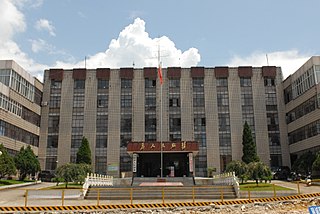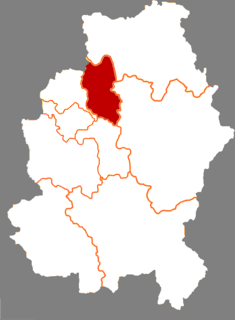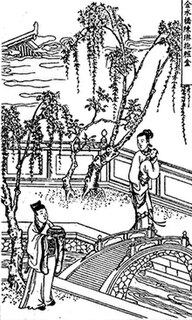
Mount Lao, or Laoshan is a mountain located near the East China Sea on the southeastern coastline of the Shandong Peninsula in China. The mountain is culturally significant due to its long affiliation with Taoism and is often regarded as one of the "cradles of Taoism". It is the highest coastal mountain in China and the second highest mountain in Shandong, with the highest peak (Jufeng) reaching 1,132.7 metres (3,716 ft). The mountain lies about 30 kilometres (19 mi) to the northeast of the downtown area of the City of Qingdao and is protected by the Qingdao Laoshan National Park that covers an area of 446 square kilometers.

Wushan County is a county located in Chongqing municipality. It occupies roughly 2,958 km2 (1,142 sq mi) and has a population of about 600,000.

Baoshan (help·info) is a prefecture-level city in western Yunnan province, People's Republic of China. Baoshan is the second-biggest metropolitan area in western Yunnan after Dali.

Liupanshui is a city in western Guizhou province, People's Republic of China. The name Liupanshui combines the first character from the names of each of the city's three constituent counties: Liuzhi, Panzhou, Shuicheng. As a prefecture-level city with an area of 9,926 square kilometres (3,832 sq mi), Liupanshui had a total population of over 2,830,000 in 2006, making it the second largest in the province, though only 251,900 inhabitants were urban residents. The city is known locally as "The Cool City" or "Cool Capital" due to its low average summer temperature.
The Praise the Dragon Flag is a semi-official national anthem of China, as well as a military and a Royal anthem.

Hua Hill (Shandong) is a solitary cone-shaped hill in the lower Yellow River valley, located at the northeastern edge of the city of Jinan, Shandong Province, China. The hill is known for its cultural and historical significance as well as for its natural environment. It has been an inspiration for Chinese artists for many centuries and was the site of the Battle of An, a major battle fought during the Spring and Autumn period.

Longling County is a county in Baoshan City, in the west of Yunnan Province, China, bordering Burma's Shan State to the south.

Hua'an (help·info) is a county of Zhangzhou City, in the far south of Fujian province, People's Republic of China

Longtan District is a district of Jilin City, Jilin, People's Republic of China.

Huashanli Station is an elevated rapid transit station located in Hexi District, Tianjin, China. It is a station on the Line 1 of the Tianjin Metro.

Wentang Town is an urban town in Xinhua County, Loudi City, Hunan Province, People's Republic of China.

Kou Zhu is a fictional Song dynasty palace maid popular in legends related to Emperor Renzong of Song, Emperor Zhenzong of Song, Concubine Li and Empress Liu.
Xiqi is an unclassified Loloish language of Huaning County, Yunnan, China. It is also called Siqipo 斯期颇 in Mile County.
Shehua is an unclassified Sinitic language spoken by the She people of southeastern China. It is also called Shanha 山哈 (San-hak) or Shanhahua 山哈话. Shehua speakers are located mainly in Fujian and Zhejiang provinces of southeastern China, with smaller numbers of speakers in a few locations of Jiangxi, Guangdong, and Anhui provinces.

The Shrine of Living Buddha is a Buddhist temple located at the Devine Light Summit (神光岭) of Mount Jiuhua, in Qingyang County, Anhui, China.

Huayan Temple is a Buddhist temple located on Mount Zhiti (支提山), in Jiaocheng District of Ningde, Fujian, China. It is the ashram of Tianguan BBodhisattva.

Shanghai Baoshan Dahua Swordfish is a Chinese professional women's basketball club based in Shanghai, playing in the Women's Chinese Basketball Association (WCBA). It is co-owned by Baoshan District government, Shanghai Sports Institute, and Dahua Group. Before 2014 it was known as Shanghai Octopus, affiliated with the Shanghai Media Group. Between 2007 and 2008 it was sponsored by the Xiyang Group.














